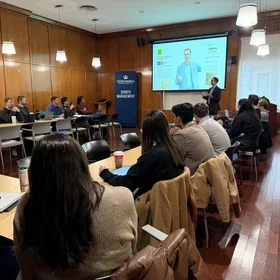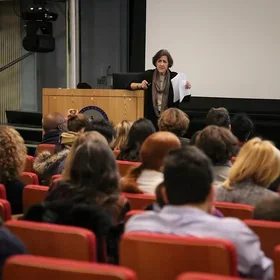Bela Borisovna Fishbeyn, a student in Columbia’s M.S. in Bioethics program, is the recipient of a Fulbright Scholarship.
The research grant will pay for her transportation and expenses for 10 months while she conducts research in Russia. The research is the subject of her master’s thesis, which will be submitted in the spring or summer of 2013. Upon graduating from Columbia, she hopes to enter a Ph.D. program in public health and health policy, pursuing her interest in global health issues.
Under the Fulbright Program, competitively selected U.S. citizens become eligible for scholarships to study, conduct research, or exercise their talents abroad while citizens of other countries may qualify to do the same in the United States. The process of applying for a Fulbright is long and involved; applications are regional, and requirements include submitting a proposal for the project as well as undergoing a language interview. Fortunately Fishbeyn is fluently bilingual.
Fishbeyn, 27, was born in Russia. Her family emigrated to the U.S. when she was five, settling in the Greensboro, North Carolina area where she attended high school, eventually earning her undergraduate degree at the University of North Carolina.
Her interests include global health issues, in particular vulnerable populations. She chose Columbia for her graduate education because “it’s the pioneering program offering a M.S. in Bioethics, and the only Ivy League school to do so,” she said. “The caliber of the professors and the focus on global bioethics drew me to the program. Dr. Klitzman (Robert Klitzman, program director) and the other professors are very involved with their students. They were always open to meeting with me and helping me develop my project. I’m particularly grateful to Drs. Kristina Orfali and Arthur Kuflik, and Mailman School of Public Health Drs. Marilena Lekas and Joanne Csete.”
In Russia, there is a perception that drug addiction is a choice and not a disease. As a result, methadone, a substitution therapy for injecting drug users commonly used in most countries, is illegal in Russia. She will study with physicians who work with addicts (called narcologists) to find out more about their views on the culpability and personal responsibility of addicts. Some of her research will take her to Kazan, the city of her birth.
“The greatest thing about the bioethics program is that Columbia is working toward advancing the field. My time and the people at Columbia helped shape this project, and I’m grateful to all of my professors for their help and support,” she said.


